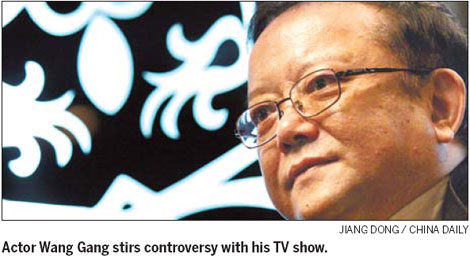Hero of TV dramas explains his passion for the hammer
By Zhu Linyong (China Daily)
Updated: 2010-03-30 10:09
 |
Large Medium Small |

Over the years, actor Wang Gang has become identified with He Shen, a corrupt minister who lived during the reign of emperor Qianlong of the Qing Dynasty (1644-1911).
Wang has played this greedy, treacherous official in more than 300 episodes of period TV dramas.
He is even addressed affectionately as "My Lord He" by his fans.
However, his TV show Tian Xia Shou Cang (world collection) has thrown him into a major controversy.
On the show, if a ceramic vase is assessed to be fake, with consent from the collector, Wang will smash it to pieces with a mallet; similarly, if a painting or calligraphy work is pronounced fake, he will draw on it with a brush, dipped in red ink.
"This is done so the fakes never re-appear in the antique market; it also makes a big impact on the greenhorn collectors," says the 61-year-old actor.
But some have slammed the show, calling it irresponsible.
Many believe that the destroyed items may include modern reproductions as well as those that may have survived for centuries and ought to be treated as authentic antiques.
Wang has anchored the lead role in a dozen TV series set in the late Qing Dynasty, including Blossoms in May, Jade Broken, The Luogu Alley, and Long Tassels in Hand, whose stories often revolve around dealers and collectors of antiques.
Even today, collectors have to match their wits against dealers in antiques shops and at dirt markets, such as Panjiayuan, Lu Jiaying and Gaobeidian in Beijing, before lifting a really good piece at a fair price, according to Wang.
He says while he has no problem with the old tradition of selling imitations, "I cannot tolerate the intentional touting of fakes as authentic The key message of my show is: Cheating is unethical and may breach the law."
Wang readily admits that he too has fallen victim to fakes.
However unlike others, as an influential public figure, Wang can always get back his money from the dealers.
Bu sometimes, he just returns the fakes without asking for a return of the amount paid.
There is an unspoken rule in antiques trading: You stick to a dealer who sells you fakes, either by accident or intentionally, until one day he sells you the authentic stuff, Wang says.
"I always try to avoid a showdown with antique dealers and this approach has helped me establish trust. As a result, they inform me of any new find as soon as possible."
Wang's attraction to art and antiques goes back to his childhood. He bought his first antique piece - a birdcage made in the Qing Dynasty - paying 5 yuan out of his pocket money to a vendor at the Taoyuan Antique Market in Changchun, Jilin province, when he was just 10.
His interest in antiques was rekindled in the late 1990s, when he was attracted by an imitation set of Ming Dynasty furniture in an antique market in Beijing.
His fascination with traditional art gradually drove him to hunt for authentic antiques.
Wang began taking collecting seriously in 1998 when he bought a qinghua (blue and white) ceramic dish from the Kangxi period of the Qing Dynasty. He calls it his first love.
He is now considered an unrivaled collector, among actors and TV presenters, of porcelain wares, ancient hardwood furniture and ink paintings.
"Antiques say so much. I love their elegant shapes, fine luster, and mysterious motifs. I think refined porcelain wares represent the essence of Chinese culture," he says.